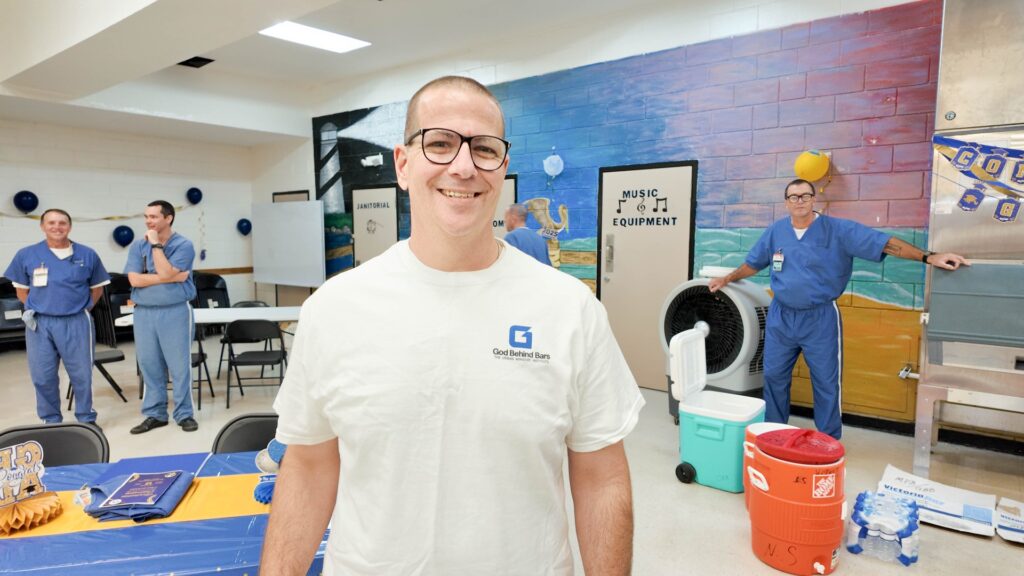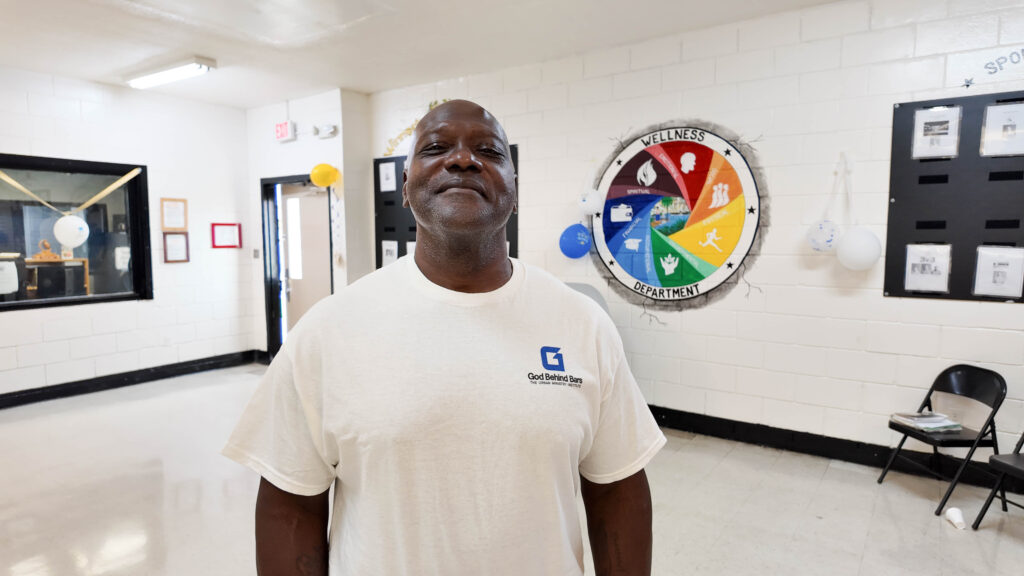In a place where dignity is often stripped away, where beige cinderblock walls and metal railings usually define the view, something unexpected was unfolding.
On a recent Friday afternoon at Polk Correctional Institution in central Florida, a space that rarely welcomes outsiders had been completely transformed. Gold and blue streamers stretched across the walls, balloons framed a ceremonial archway, and at the foot of the stage, a tall vase held 20 red roses—one for each man about to be honored.
Guests shuffled into rows of metal folding chairs, their arrival accompanied not by the clanging of cell doors but by the gentle strum of a guitarist singing about God’s love.
Graduates With a New Purpose
Waiting just beyond the archway stood 20 men—fathers, brothers, uncles, grandfathers. Convicted criminals, yes, but on this day they were also graduates of a year-long program of The Urban Ministry Institute (TUMI), administered by God Behind Bars. Wearing crisp black caps and gowns over their prison blues, they shifted nervously, preparing to walk a stage few ever imagined they’d reach.
For the men in caps and gowns that day, the ceremony represented far more than a line on a résumé. It marked a rebirth of calling, a declaration that even within prison walls, God’s mission continues.

The Great Commission Behind Bars
That mission is the Great Commission. Found in Matthew 28:19-20, it commands Christians to go into all the world, making disciples by baptizing converts and teaching them to obey all of Jesus’ commands, with the promise of his constant presence until the end of the age. The work is not only about conversion—it is about shaping lives, fostering obedience to Christ, and forming communities of faith.
TUMI’s Cornerstone curriculum, through World Impact, exists for this very reason. Its accelerated one-year format offers core biblical and theological training to Christians seeking to serve in communities of poverty. It equips leaders to teach, shepherd, and multiply disciples—even in the most unlikely of settings.
Kenneth’s Journey of Faith and Leadership
“There were many moments along the road where it was like, can I carry this out and see this through to the end?” said Kenneth, one of the graduates. As both a student and facilitator in his class, Kenneth carried heavy expectations. There were days he doubted whether he could be a role model or find the right words when others sought his counsel. On days when tensions in his cell ran high, he wondered most of all if he was holy enough.
“There’s days when you’re trying to get through to the people you’re working with and you’re trying to tell them the truth with love, to walk alongside them even though they’re making [questionable decisions],” he said. “You’re not going to be there to make their decisions for them, so you’re dealing with those frustrations.”

Kenneth’s doubts echo the weight of discipleship itself. Making disciples means walking alongside others in weakness as much as in strength. It is the slow work of modeling Christ, not just teaching about him. And yet, Kenneth leaned on the truth that steadied him: “We all live alongside each other. We are a team in all of this.”
Richard’s Story of Reconciliation
Another graduate, Richard, carried a different burden—one not only spiritual but deeply personal. Taking the lectern to share his testimony, he spoke about a disastrous decision that landed him in prison and cost him more than freedom. It severed his relationship with his beloved daughter. For years she refused all contact, so he wrote faithfully to his mother instead, sending letter after letter in hopes they might someday reach her.
Slowly, something broke open. His daughter began to read the words her grandmother passed along. A hardened heart softened. Visits followed and she slowly saw his transformation in Christ. Then, one momentous day, she uttered the word he had longed to hear: “Dad.” Choking back tears, Richard recalled, “She called me dad.” In the audience, his daughter sobbed quietly while his family wept with joy.
A Clearer Purpose Through TUMI
Even seasoned believers who committed themselves to the TUMI curriculum found themselves coming to a new understanding of building God’s kingdom.
“I was raised in church, but TUMI helped me break down some traditions and some things that weren’t quite true about the living God,” said Kurt, another graduate. “Before, I was confused, and my purpose wasn’t clear. This showed me who God really is and helped me out of the ruts that were pushing me away.”
For Kurt, walking across the stage was more than a moment of recognition or applause—it was a tangible affirmation of faithfulness, a marker of the inner work God had been doing in his life.

“To walk across the stage means that I see God smiling on me because I’ve been obedient. I listened to him when I joined TUMI,” said Kurt. “Now I have a better picture. TUMI has helped me understand how to draw men to God so they can be discipled.”
A Ceremony of Redemption
Stories like Kenneth’s, Richard’s, and Kurt’s reveal why TUMI’s work inside prison walls matters so profoundly. It is not about filling time behind bars. It is about fulfilling Christ’s command—equipping leaders who will disciple others, whether that means leading Bible studies in the dorms, mentoring a younger prisoner, or rebuilding broken family ties on the foundation of grace.
And the ceremony itself made the transformation visible.
When Rev. Dr. Don Davis, TUMI’s founder, appeared on a screen to read each man’s name aloud, graduates no longer heard themselves identified as numbers in a system. They were named as scholars and men of God. Shoulders squared. Smiles flickered. Families applauded.
And in that moment, the air in the room carried something both solemn and electric: the weight of redemption, the fragile joy of renewal.
Read next: Transforming Lives Behind Bars: A Conversation with Scott McLean of Pathway to Freedom
Want to learn more about TUMI? Click here.
Help us bring Gospel-centered training to more incarcerated individuals by donating today!
